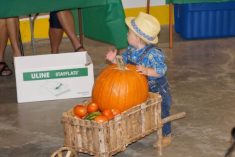The COVID-19 pandemic, and Canada’s response to it, have highlighted how rural communities need different strategies than their urban counterparts to provide social services on which the public relies.
The Arrell Food Institute at the University of Guelph hosted a virtual panel in May to discuss COVID-19’s social impacts, in which researchers from a variety of fields reviewed both the negative and positive takeaways so far.
Jacqui Empson Laporte works with rural communities in her role with the Ontario Ministry of Agriculture, Food and Rural Affairs, and also volunteers with Victim Services in Huron County, Ont. where she lives.
Read Also

China seeks improved ties with Canada amid rising trade tensions
China called on Friday for steps to improve bilateral ties with Canada, saying there were no deep-seated conflicts of interest, following a spike in trade tensions with many of Beijing’s Western trade partners this year.
“In both roles, I’m seeing the stress in farmers and their families, caused by disruptions by the supply chains or even the threat of supply chain disruptions,” she said, noting market uncertainty as small businesses in small towns are trying to adapt to new consumer needs.
Victim Services in her community is small and largely volunteer-driven — and under pressure from the pandemic.
“When our volunteer base is undergoing stress at the scale COVID is pushing on our communities, it really starts to destabilize our establishments,” she said.
It increases the burden on staff, she said, and requires narrowing the scope of calls to which they respond to primarily fatalities and violence, because those incidents are likely to cause the biggest ripples in a community.
“It’s really hard to reach out for help when your stuck in your home in the same conditions that are causing the crisis, so if there is a challenge of addiction or domestic violence or mental health, people are not only isolated by distance in rural Ontario but isolated because of the travel restrictions.”
More tele-counselling opportunities are needed and could help rural communities, she said, but those opportunities are only available where there’s reliable internet service.
Helen Hambly Odame, an associate professor at the University of Guelph who focuses her research on connectivity of rural areas, said the pandemic shows “how essential broadband has become for every single Canadian, urban and rural.”
A “digital divide” that has made it difficult for some rural communities to adapt to changes resulting from the pandemic, she said, as those lacking connectivity are experiencing more isolation from society and the economy.
“We can see how essential connectivity is,” she said, adding later the internet is a current challenge but also a source of great opportunity in the future. “Let’s look at the future as one of opportunity through connectivity.”
She is also hopeful some workplaces recognize employees can successfully work from home and that “some of those workers choose to work from home in rural Ontario.” That, in turn, could become an economic driver for rural communities, she said.
Ryan Gibson, a University of Guelph associate professor who focuses on rural planning and development, told the panel the ability of people in rural communities to volunteer their time has been compromised because of COVID-19.
Many non-profits have had to rethink how they deliver services, he added.
Volunteerism has been “a really key feature” and part of the fabric of rural communities, he said, and while there are typically ebbs and flows, those communities right now ” are challenged in how they respond during the COVID-19 crisis.”
He singled out support for newcomers in rural communities.
“This pandemic has caused a disruption in terms of the supports for the newcomers, it’s challenged the ability to tap into that social fabric, to be able to participate and volunteer, to have your kids take part in extracurricular activities,” he said.
Abdul-Rahim Abdulai, a PhD student at the University of Guelph, echoed that sentiment.
“Most newcomers, like myself, can find a community in a community,” he said, adding it’s difficult to settle in without that support network. “Just moving into a new area by yourself can be very challenging, of course.”
Post-pandemic, “we need to start thinking why our responses to COVID-19 need to look different in different places,” Gibson said, because urban strategies may not be the best response for rural areas.
“One of the really important things we have to think about as we move forward is how to build place-based strategies, how do we build on the assets that are currently in our communities, within the people who live there, and how can we use those assets to meet our local priorities.”
— D.C. Fraser reports for Glacier FarmMedia from Ottawa.
















